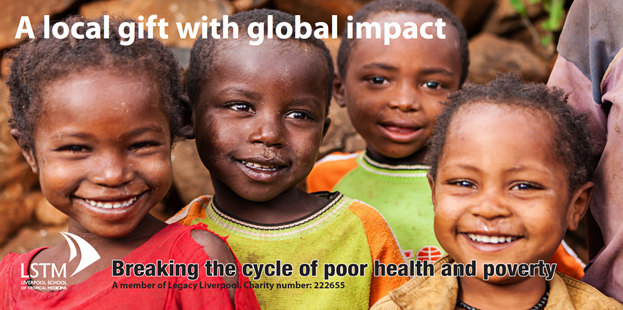
Liverpool school of Tropical Medicine (LSTM) was founded in 1898 as a result of a charitable donation and, while LSTM only became a registered charity in 1963, it has relied on philanthropic giving ever since.
11th- 18th is Remember a Charity Week, a national initiative designed to encourage more people to consider leaving a gift to a charity when writing a will. As a member of Legacy Liverpool, a group of local charities, LSTM is taking part in a number of initiatives this week to raise the profile of legacy giving and the difference it can make.
LSTM’s Director of Fundraising, Karen Brady, said: “Recent polls have shown that nearly two thirds of the UK adult population do not have a will, and of the third who do, only 7% of them have included gifts to charities. Nevertheless, legacy donations are critical to UK charities, creating more than £2billion a year for vital services and good causes. LSTM has been the beneficiary of many legacy donations over the years, which have played a key role in developing the world-leading institution it is today.”
Aside from research funding, legacy and philanthropic giving have been responsible for many of LSTM’s milestones:
- LSTM’s original school building opened in 1915 thanks to a fundraising appeal that led to a substantial gift in the will of LSTM’s founder Sir Alfred Lewis Jones
- The Gwendolyn Clayton Scholarship Fund and Jean Clayton Fellowship Fund were established in 1986 after the sisters left gifts in their wills. The funds have supported numerous students to study at LSTM from developing countries and to cover travel costs in carrying out their research.
- Dr Adam Roberts was appointed, in part, because of a donation in memory of the late Anne and Hugh Johnson. His group is looking at new drugs and diagnostics in the fight against antibiotic resistance, one of the biggest problems facing modern medicine.
“LSTM is a world leading institution.” Continued Karen Brady, “And while we receive numerous grants and awards for our research, legacies represent a gift that is unrestricted, allowing us to invest in our people, our facilities and in training the next generation of doctors and scientists who will answer the biggest questions in global health, today and in the future. A legacy to LSTM helps us to break the cycle of poverty and poor health.”
To find out more about writing a will and remembering a charity click here.